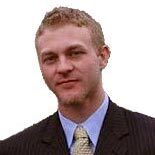Gary Emerling

US News and Review, Washington, D.C.
Journalism, B.A. '04
If you'd have asked Gary Emerling during his high school years what he'd be doing after college, chances are that he'd never have envisioned where he is today, in the nation's capital as a reporter for the Washington Times.
"Journalism as a major didn't really occur to me until I reached college," recalls Emerling.
But once he stopped to consider it, it seemed a natural fit. "I was good at writing... I'd always loved reading the paper. It just made sense," he says.
Emerling got his start in journalism covering not politics, but sports. In his sophomore year, he reported on soccer and baseball games for The Chimes, Biola's student newspaper. The next year, he applied and was accepted as The Chimes' sports editor. Following this, he served as editor-in-chief during his senior year.
Emerling believes that his work at The Chimes was one of the best parts of his Biola career in terms of preparing him for the outside world.
"I was able to see how the business works even on a small scale like that," he says.
Besides his many hours spent at The Chimes, Emerling also jumped at the chance to intern at the sports department of his local paper, the San Gabriel Valley Tribune, between his junior and senior years of college.
But his big break came when he took a class at Biola through which he met then-Washington Times reporter George Archibald, whom the professor had invited to guest-lecture. Later, when Emerling traveled to Washington on a missions trip, he reconnected with Archibald, who introduced him to several staff members at the Times. Emerling stayed in touch, and, after graduation, obtained an internship at the newspaper. As a general assignment reporter, Emerling covered local crime, politics and feature stories in Washington, Maryland and Virginia.
At first, says Emerling, working at the Times was "terrifying."
“It was scary coming out here into this atmosphere — not only in regards to the general challenge of being on my own in the real world for the first time, but also the fact that in the newsroom, as in the city itself, people are always striving to get ahead."
Equally as intimidating was the fact that, after being in the "Biola bubble" for four years, Emerling was suddenly surrounded by unbelievers in a secular newsroom. “In this kind of environment, it's hard sometimes to stand out from the crowd," he says. However, he soon found that people were generally willing to listen to him talk about his faith if he presented it in the right way.
“I haven't really laid out like the Four Spiritual Laws to anyone or anything, but I have been able to have conversations with people about why I believe the things I believe and why I do or don't do certain things — because I'm a Christian. I also make it no secret that I go to church and have extended the invitation to a couple co-workers to come with me."
Being in such a competitive environment also made it more difficult to keep his eyes on the Lord. “It's hard sometimes to keep your focus where it should be, on glorifying God, instead of just getting sucked into that struggle of trying to get ahead in your career," he notes. “But the foundation I received at Biola was definitely a factor in keeping me grounded."
There were challenges for Emerling journalistically as well; he remembers having difficulty getting used to what editors were looking for. Early on in his days with the Times, he was assigned a story about political speakers being invited to college, after a local university had invited Michael Moore. The editor wanted 15 inches or so, but Emerling turned in nearly 40 — and the editor ended up killing the story. “It was kind of embarrassing," admits Emerling, “but after that, I knew more of what they were looking for from me at the time."
After six months of interning at the Times, Emerling was hired as a night clerk. He next moved up to day clerk, and then to his present position as a city politics reporter.
Though Emerling had originally entered journalism because of the appeal of sports reporting, "I was next in line for a reporter slot, and the city politics spot was the one that opened up," he says. "I thought it would push me, because I'm not the political kind of person."
Emerling says that he likes his beat “a lot more now than before" — enough to where he's all but abandoned his former ambition of becoming a sports reporter.
"Even though the Times told me when I was put on the metro desk that they might eventually move me to sports, I don't see myself going back to it. There's a certain weightiness about what I write for my section; I write about things that will affect people's lives. There's more potential for change."
Emerling isn't sure he wants to cover politics for the long haul, but he relishes the experience he's getting as he covers his beat.
"God put me here for now," he says. “And I've already learned and grown a ton in the process. I'm excited to keep doing that and to see what the future has in store."
